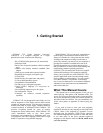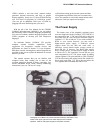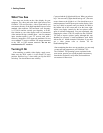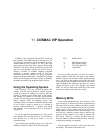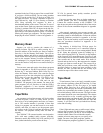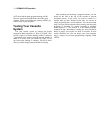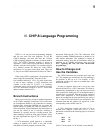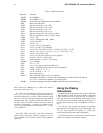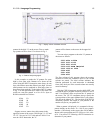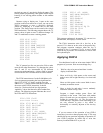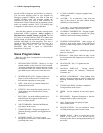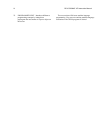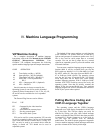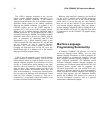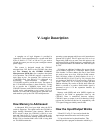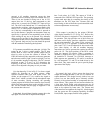
When a pattern is displayed, it is compared with any
pattern already on the screen. If a 1 bit in your ,pattern
matches a I bit already on the screen, then a 0 bit will be
shown at this spot position and VF will be set 1,6
it
value
of 01. You can test VF following a DXTN instruction to
determine if your pattern
III. CHIP-8 Language Programming 15
Fig. 1 - Display screen coordinate structure.
pattern for the digit "8" on the screen. First we make pattern will be shown on the screen in the upper left
up a pattern of bits to form "8" as shown in Fig. 2. corner.
Fig. 2 - Patternof bitsjorming digit 8.
In this example we made the "8" pattern five spots
high by four spots wide. Patterns to be shown on the
screen using the DXYN instruction must always be one
byte wide and no more than fifteen bytes high. (Several
small patterns can be combined to form larger ones on
the screen when required). To the right of the."8" pattern
in Fig. 2 are the equivalent byte values in hex form. We
could now store this pattern as a list of five bytes at
RAM location 020A as follows:
020A F0
020B 90
020C F0
020D 90
020E F0
Suppose we now want to show this pattern in the
upper left corner of the screen. Well assign V I= VX and
V2=VY. Now we let VI=V2=00 and set I=020A. If we
now do a D125 instruction, the "8"
You can write a program to show the "8" pattern on
the screen as follows:
0200 A20A I=020A
0202 6100 V1=00
0204 6200 V2=00
0206 D125 SHOW 5MI@VlV2
0208 1208 GO 0208
020A F090
020C F090
020E F000
The first column of this program shows the memory
locations at which the instruction bytes in the second
column are stored. The third column indicates the
function performed by each instruction in shorthand
form. Only the bytes in the second column are actually
stored in memory.
With the CHIP-8 interpreter stored at 0000-OIFF, you
can load the above program in memory and run it. Set VI
and V2 to different values to relocate the “8" pattern on
the screen. The VX-VY coordinates always specify the
screen position of the upper lefthand bit of your pattern.
This bit can be either 0 or 1. The last digit of the DXYN
instruction specifies the height of your patterns or the
number of bytes in your pattern list.



